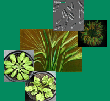| Clemens, S; Kim, EJ; Neumann, D; Schroeder, JI: Tolerance to toxic metals by a gene family of phytochelatin synthases from plants and yeast, EMBO J., 18, 3325-3333 (1999), doi:10.1093/emboj/18.12.3325 | |
| Abstract: Phytochelatins play major roles in metal detoxificationin plants and fungi. However, genes encoding phyto-chelatin synthases have not yet been identified. Byscreening for plant genes mediating metal tolerancewe identified a wheat cDNA, TaPCS1, whose expressionin Saccharomyces cerevisiae results in a dramaticincrease in cadmium tolerance. TaPCS1 encodes aprotein of ~55 kDa with no similarity to proteins ofknown function. We identified homologs of this newgene family from Arabidopsis thaliana, Schizosaccharo-myces pombe, and interestingly also Caenorhabditiselegans. The Arabidopsis and S.pombe genes were alsodemonstrated to confer substantial increases in metaltolerance in yeast. PCS-expressing cells accumulatemore Cd2⫹than controls. PCS expression mediatesCd2⫹tolerance even in yeast mutants that are eitherdeficient in vacuolar acidification or impaired in vacu-olar biogenesis. PCS-induced metal resistance is lostupon exposure to an inhibitor of glutathione biosyn-thesis, a process necessary for phytochelatin formation.Schizosaccharomyces pombe cells disrupted in the PCSgene exhibit hypersensitivity to Cd2⫹and Cu2⫹andare unable to synthesize phytochelatins upon Cd2⫹exposure as determined by HPLC analysis. Saccharo-myces cerevisiae cells expressing PCS produce phyto-chelatins. Moreover, the recombinant purified S.pombePCS protein displays phytochelatin synthase activity.These data demonstrate that PCS genes encode phyto-chelatin synthases and mediate metal detoxification ineukaryotes. |

Letzte Änderung 26.02.2021

